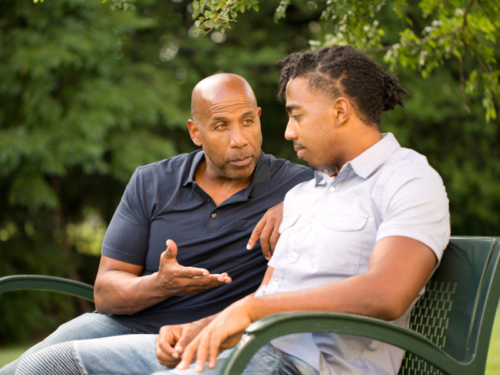
Table of Contents
Is Your Family Close or Enmeshed?

Written By: Alex Bachert, MPH

Clinically Reviewed By: Dr. Don Gasparini
April 29, 2024
5 min.
Family enmeshment stems from a lack of privacy and emotional boundaries. Discover three tips for how to develop a healthier relationship with your family and yourself.
Learn more about our Clinical Review Process
Table of Contents
Families with a healthy emotional bond are characterized by mutual support, intimacy, and warmth without compromising anyone’s autonomy. Having a close relationship with your family can lay the foundation for increased emotional well-being, less stress, and better overall health.
So why does research show some close families are actually causing more harm than good? These close but harmful family relationships are known as enmeshed families — a dynamic where family members become so emotionally entangled that they can’t prioritize their own needs. Read on to learn more about the signs and symptoms of family enmeshment and how to heal from enmeshed family relationships.

Healing for the whole family
Our programs combine supportive groups with individual and family therapy.
What is family enmeshment?
First introduced by family therapist Salvador Minuchin, the term enmeshment describes relationships that struggle to balance autonomy and connection. With a healthy family dynamic, each family member has their own identity, opinions, and freedom to make decisions. However, in an enmeshed family, family members become so involved in each other’s lives that it can be hard to understand their own needs, goals, thoughts, and feelings.
Family enmeshment can occur between parents and children, siblings, or several family members at once. It stems from multiple factors, including dysfunctional family dynamics, behaviors passed through generations, and parenting issues.
“Enmeshment can be seen as a form of generational trauma. It passes from family to family through the years and is illustrated by a lack of appropriate adult/child boundaries,” says Alysson Thewes, MSW, LCSW, Primary Therapist with Charlie Health.
It can also be caused by dysfunction and abuse within the family, explains Na’Keora Bryant, MSCP, a Charlie Health Group Facilitator. “For example, a single mother who lives through her child, thereby making the child feel smothered,” describes Bryant.

Signs of enmeshment family
“In an enmeshed family, healthy boundaries are absent,” says Thewes. “Common signs of enmeshment in a family can include children feeling responsible for their family members’ feelings or being treated by the adults in their family like friends or confidants, instead of like growing children,” she explains.
Although these may sound like obvious red flags for an unhealthy child-caregiver dynamic, it’s not always easy to recognize enmeshment if it’s always been part of your family dynamic. Potential signs of family enmeshment in children and teens are as follows:
- Difficulty making decisions on your own or saying no to others
- Feeling like it’s your responsibility to keep your family happy
- Lack of a strong sense of self outside of your family
- Struggling to make or keep friends because of intense family connections
- Being responsible for family members’ emotional or financial needs
- Avoiding voicing your own needs so that you don’t upset family members
Potential signs of family enmeshment in adults include:
- Believing that your child gets all the support they need from the family
- Oversharing personal information with your child
- Relying on your child for emotional support and validation
- Making decisions for your child
- Centering your life and self-worth around your child
- Refusing to accept when your child needs more independence
- Expecting your child to follow your values and beliefs
Long-term effects of family enmeshment
Over time, being in an enmeshed family can take a toll on a person’s sense of self, goals, and overall mental well-being. For example, research shows that teens who perceive high levels of family enmeshment may be more likely to have greater emotional dysregulation, such as negative moods and lower distress tolerance. Family enmeshment can also contribute to:
- Low self-esteem
- Lack of identity
- Unhealthy, codependent relationships
- Conflict avoidance
- Fear of abandonment
- Lack of independence
Ways to heal from family enmeshment
Having access to the right resources and support can help people begin the process of healing from family enmeshment. For many people, this includes working with a therapist or other mental health professional.
“Healing can take place with both the parent and child while the child is still in the home, or it can occur once the child has become an adult and left the home,” says Thewes. “If the former, self-awareness and motivation to heal and learn on the part of the parent are key. Seeking help from a therapist experienced in working with families and with trauma would be essential,” she explains.
Adult children can also benefit from working on personal boundaries, she adds, suggesting that they work with a therapist who has experience treating families with trauma. In addition to seeking professional support, here are three other tips for learning to overcome a history of family enmeshment.
1. Create clear boundaries
With enmeshment, family members become so involved in each other’s lives that boundaries become blurry. An important part of the healing process is taking time to think about your needs and how to convey that information to your family. Boundaries can be around emotions, communication, finances, and personal choices and should always be based on your own personal thoughts, feelings, and desires.
2. Reconnect with yourself
When you’re so busy focusing on other people’s needs, it’s easy to lose sight of what matters to you. Take some time to discover your interests, passions, values, and goals. If you’re not sure where to start, here are a few questions to help you learn more about yourself.
- What’s your favorite food?
- What’s your dream vacation?
- What are you grateful for each day?
- What are your strengths?
- Which piece of advice would you offer your younger self?
- What can you start doing today to create a more fulfilling future?
3. Show yourself patience and compassion
Changing deeply rooted behavior and thought patterns doesn’t happen overnight. In fact, it may take weeks, months, or even years. Throughout the process, remember to be patient and show yourself compassion as you create space to build balanced relationships and improve your overall health and well-being.

How Charlie Health can help
If you’re struggling with your family relationship, Charlie Health is here to help. Charlie Health’s virtual Intensive Outpatient Program (IOP) provides more than once-weekly mental health treatment for young people and families dealing with serious mental health conditions, including enmeshed family relationships. Our expert clinicians incorporate evidence-based therapies, like cognitive behavioral therapy and dialectical behavior therapy, into individual counseling, family therapy, and group sessions. With this kind of holistic treatment, learning how to have a healthy relationship with your family is possible. Fill out the form below or give us a call to start healing today.




